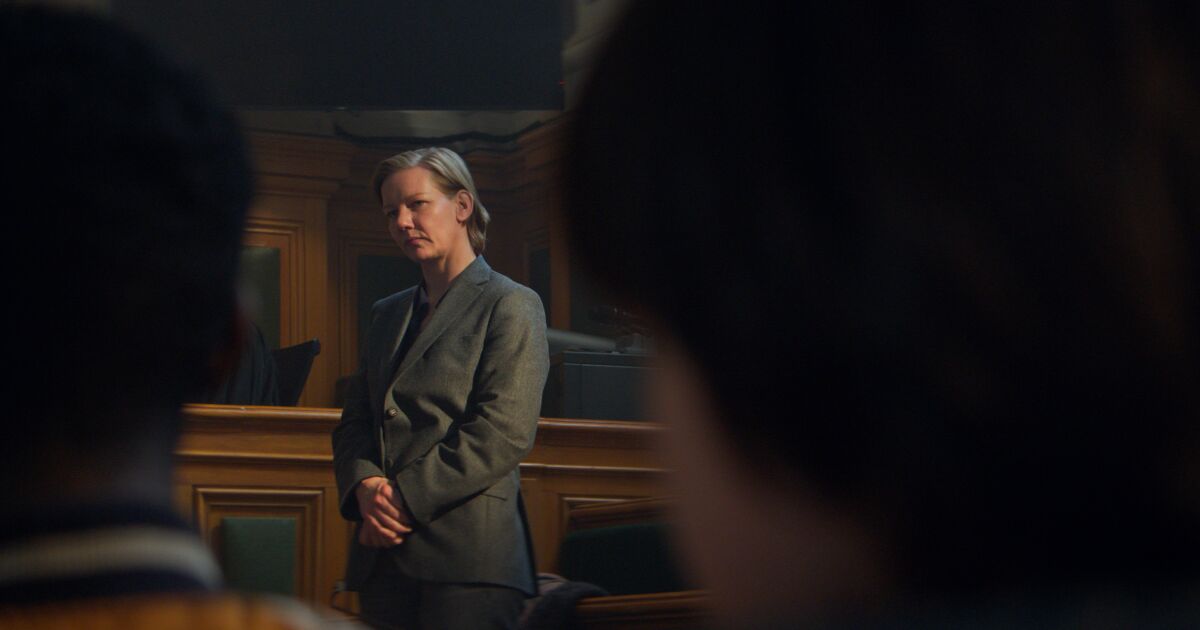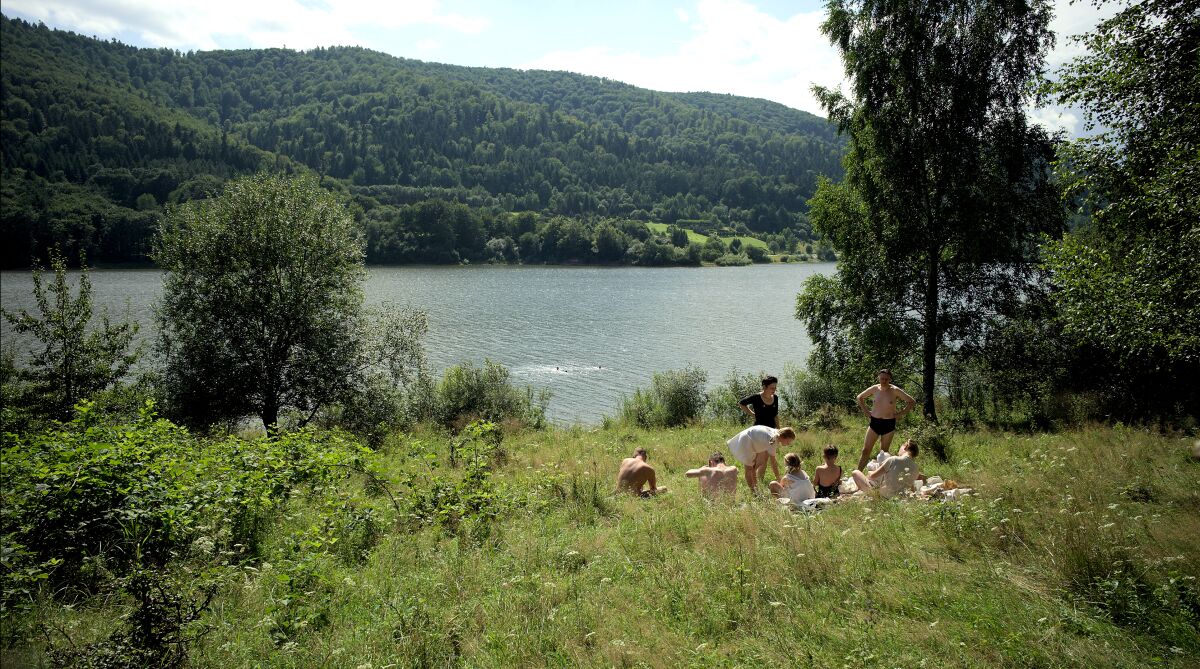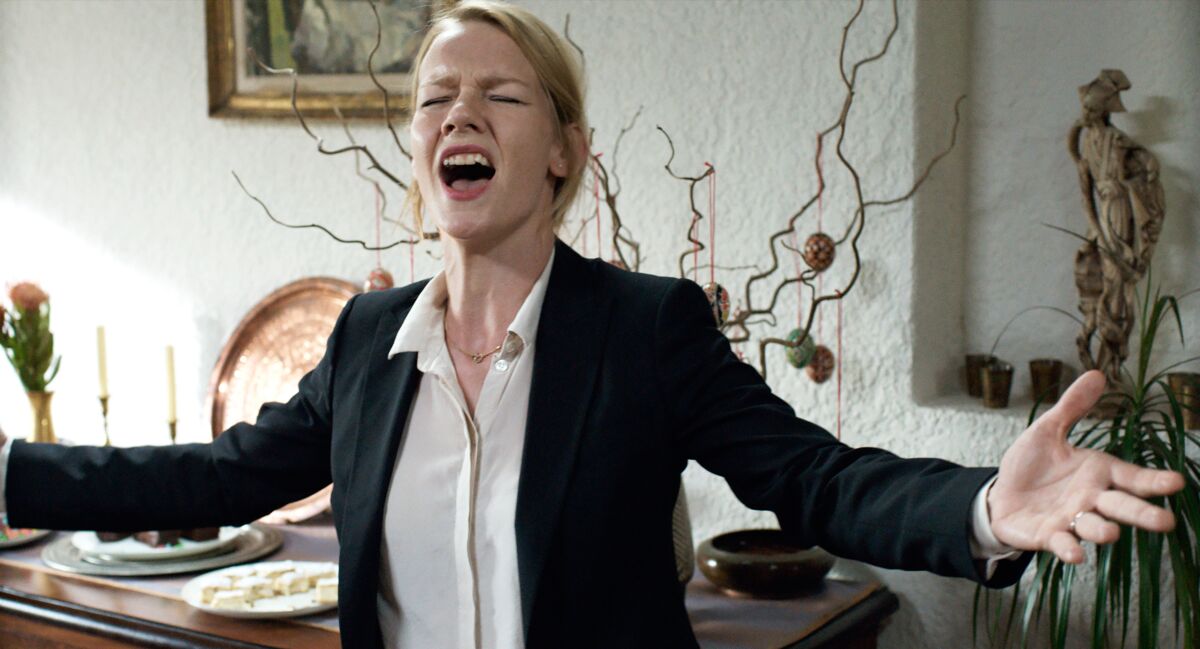
“Anatomy of a Fall,” one of the strongest movies competing for the Palme d’Or at the 76th Cannes Film Festival, opens with a one-on-one interview that quickly goes south. A successful novelist named Sandra, played by the German actor Sandra Hüller, has invited a graduate student to sit down with her at her family’s chalet in the French Alps. The two get along well enough, but then comes an ear-splitting blast of music from upstairs — Sandra’s writer husband, Samuel (Samuel Theis), is in a foul mood and wants to make it known — and the interview comes to an abrupt halt.
It’s a tense, playful opener that hints at the marital and legal drama to come in this intricately plotted mystery from the French director and co-writer Justine Triet. Within minutes, Samuel will have fallen to his death from one of the chalet’s upper stories. Sandra is tried for his murder, and she’ll spend the rest of the movie being questioned repeatedly, by judges, lawyers and, most wrenchingly, her own adolescent son, Daniel (Milo Machado Graner).
And so it’s a funny thing to sit down for an interview with Hüller, 45, on a sunny rooftop terrace here in Cannes. We too get along well enough (we served together on the Berlin International Film Festival competition jury in 2019), but fortunately, no music interrupts our conversation and no one goes tumbling down to the street below. Instead Hüller, who’s just dashed over from a news conference, sips water and apologizes needlessly for having a bite during our conversation. When you’re starring in two movies in the Cannes competition — a few days before “Anatomy of a Fall’s” gala premiere, Hüller walked the red carpet for Jonathan Glazer’s Holocaust drama, “The Zone of Interest” — you eat whenever you can.
Still, there are obvious benefits to having two films, and not just because Hüller, one of the finest European actors working today, is considered a strong contender for the jury’s actress prize. If she wins, she’s likelier to be cited for “Anatomy of a Fall,” in which she gives a lead performance of breathtaking ambiguity and emotional range, than for “The Zone of Interest,” in which she meets head-on the unenviable challenge of playing Hedwig Höss, wife of the notorious Nazi commandant Rudolf Höss (Christian Friedel).
Hüller as Michaela in the 2006 movie “Reqiuem,” directed by Hans-Christian Schmid.
(23|5 Filmproduktion, Bavaria Film International)
“Strangely, if it’s two films [at Cannes], it takes the pressure away from one,” Hüller says. “The not-so-nice part is that you have to say goodbye to one crew to be with another.” She’s grateful, at least, that Glazer made time to see “Anatomy of a Fall,” and that Triet did the same for “The Zone of Interest.” Hüller herself had plans to see just one other movie at the festival, also in competition: “Club Zero,” the latest from the Austrian filmmaker Jessica Hausner, who directed Hüller in the 2014 period drama “Amour Fou.”
Back then, Hüller was still best known for her intense performance as a woman who undergoes an exorcism in the 2006 German drama “Requiem.” In 2016, though, she vaulted to even greater international attention as an ambitious corporate climber navigating a tricky relationship with her father in Maren Ade’s sui generis comedy, “Toni Erdmann.” The movie was a critical sensation but left Cannes empty-handed, despite having been tipped for the Palme d’Or, or at least an actress prize for Hüller.
Although her two Cannes titles this year could scarcely be more different — “Anatomy” is expansive and knotty, “Zone” compact and austere — they both showcase her flinty intelligence, her emotional ferocity and her utter fearlessness at taking on characters who make no demands of the viewer’s sympathy. In “Anatomy of a Fall,” she plays a woman who may or may not have murdered her husband; in “The Zone of Interest,” she plays a woman turning a blind eye to her husband’s murders.
While Hüller has never been one to shy away from a challenge, she did initially balk at the idea of playing a woman as unambiguously monstrous as Hedwig Höss, though she eventually came around.
“I realized that it was a very cowardly move to say, ‘I hate her so much, I don’t want to play her,’” Hüller says. “I mean, [the Hösses] existed. They were human beings. That doesn’t mean that we must like them or love them or even respect them. … So, I went to that place.”
In the end, she couldn’t resist the opportunity to work with Glazer, a much-admired British filmmaker known for audacious and disquieting films such as “Birth” and “Under the Skin.” “The Zone of Interest,” a forthcoming A24 release, is no exception; it’s a formally rigorous, daringly conceptualized portrait of the Hösses’ home life on the grounds just outside Auschwitz, the death camp that Rudolf Höss oversaw for several years. Hüller describes the production as “different from any kind of shooting that I’ve ever experienced” — partly because of the extremity of the story, and partly because it was shot with tiny cameras that were hidden throughout the set, a painstaking replica of the Höss homestead.
Because they couldn’t see most of the cameras or guess which angles were being captured, the actors were granted considerable freedom of movement. There wasn’t much rehearsal; the idea was not to perform scenes so much as to enact the Hösses’ everyday domestic rituals in something close to real time. Even so, Hüller says, this freedom was always held in check by a sense of how constricted, morally and psychologically, the characters were.
“There was a lot of freedom in this moving around the house, but of course at the same time there wasn’t, because they are not free people, as I imagine them,” she says. “People who are driven by hate are not free to me.”

“The Zone of Interest” studies the deciptively picturesque life of the family of a Nazi commandant.
(Cannes Film Festival)
During the four weeks she spent shooting “Zone” in the summer of 2021, Hüller made no effort to humanize Hedwig; the character’s humanity, like her monstrosity, was a given. She emphasized Hedwig’s insecurity about her class and her appearance, with her severe updo and unflatteringly oversize dresses. Hüller also played up the character’s greed, particularly in an early scene in which she tries on a fur coat stolen from a recently executed Jewish woman.
“Maybe [Hedwig] wants to be an elegant woman, and she can never achieve that,” Hüller says, adding that the aspiration is perhaps the one level on which she can personally relate to Höss. “I always, of course, try to connect with [my] characters,” she says. “But in this case, I really had to decide if I would give anything to her, and I decided no, she won’t get anything.”
Hüller says her most difficult scene takes place by the river near the house, when Hedwig learns that Rudolf is about to be transferred to a post in Germany, potentially upending the family’s comfortable existence. In that moment, Hedwig sheds a tear — an emotional response that Hüller says disgusted her when it emerged. But Glazer assured her it was fine for the character to show emotion, and Hüller herself found a way to explain it away: “She’s a bit manipulative at that moment, so maybe it’s not a real tear.”
Coincidentally, the most memorable scene in “Anatomy of a Fall” is also a marital spat, one that plays out in an explosive mid-movie flashback. It’s an extraordinarily lacerating sequence, cinematic yet also theatrical in its unusual duration and intensity, and it had to be filmed from start to finish every time: “We quickly realized that you can’t go back and forth, because once you enter it, it just grows and grows and grows,” Hüller says. “We couldn’t shoot it in pieces. It wasn’t possible.”
In narrative terms, the revelation of a violent quarrel that took place shortly before Samuel’s death is potentially damning for Sandra, strengthening her possible motive for murder. But as we see and hear Samuel ripping into Sandra, accusing her of being selfish, controlling and insufficiently maternal toward Daniel, Hüller turns this indictment into a kind of vindication.
While the question of Sandra’s guilt or innocence is left teasingly unresolved, it’s hard to look at her and not see a woman whose main crime appears to be feminism. Sandra doesn’t call constant attention to the sacrifices she’s made to support her husband and son, and she doesn’t exist solely or even primarily to accommodate their needs and wants. She also doesn’t apologize for being a more gifted, accomplished writer than Samuel is.
“I was wondering all the time, what could she have said or done to end this [argument]? And there is nothing,” Hüller says. She also rejects the notion, floated by some who’ve seen the movie, that her character is somehow cold. “I watched the movie last night again, and I thought, where the hell would be the moment when this woman is cold? I really have no idea. Because she’s talking about facts? Because she’s strong for her child? Because she doesn’t smile at everyone?”

Sandra Hüller as the daughter, Ines, in the 2016 film “Toni Erdmann.”
(Sony Pictures Classics)
“Anatomy of a Fall,” which Neon acquired for U.S. distribution during the festival, marks the second collaboration between Triet and Hüller, after the slippery 2019 comic thriller “Sibyl.” In that movie, Hüller had a screamingly funny supporting role as a harried film director navigating an unholy mix of personal and professional disasters. She and Triet became friends, and the director said she wanted to work with her again — an invitation that Hüller didn’t necessarily trust (“People say a lot,” she says) until Triet sent her the script for “Anatomy of a Fall.”
And trust, more than anything, is what unites Hüller’s experiences working with two directors on two different movies, shot a year apart, that have generated some of the most passionate acclaim at Cannes this year. She describes Glazer as “an extraordinary human, with such vulnerability and openness,” who, for all his formal exactitude, refused to box his actors in. She describes Triet as a filmmaker of infectious on-set energy, “a very free mind and a free woman, and I really, really admire her for that, from the depths of my heart.”
While both movies were uniquely challenging experiences, Hüller says they weren’t especially hard, particularly when compared to earlier, less pleasant experiences she’s had as an actor.
“You know what I find hard, when making movies? When people don’t behave,” she says. “Hard is people being disrespectful. Hard is when somebody lies to you, when somebody’s keeping information from you in order to manipulate you into playing something because they don’t trust you. That is hard.”












